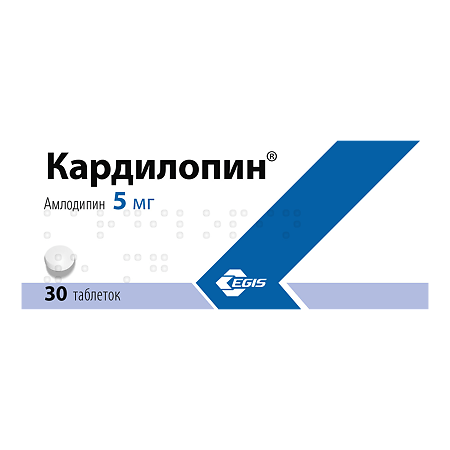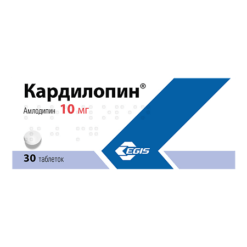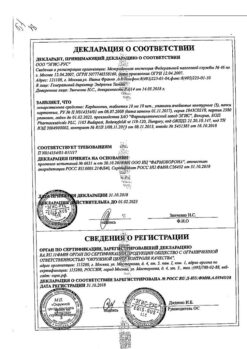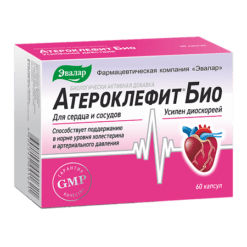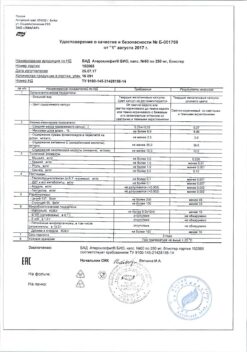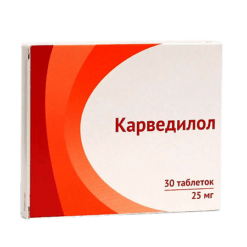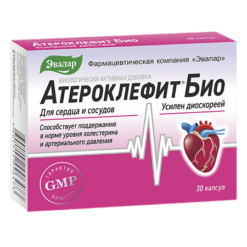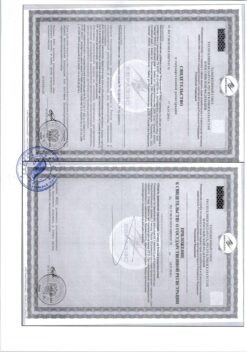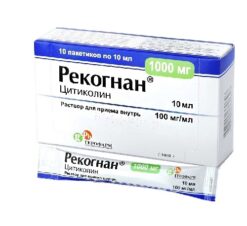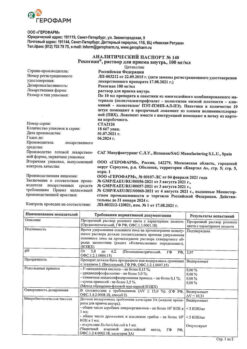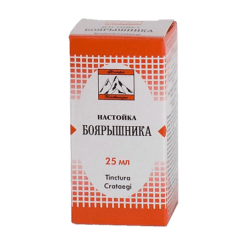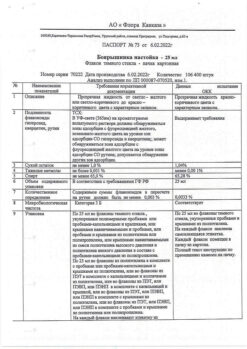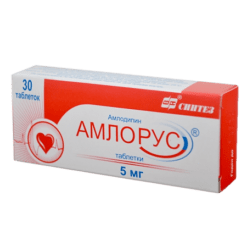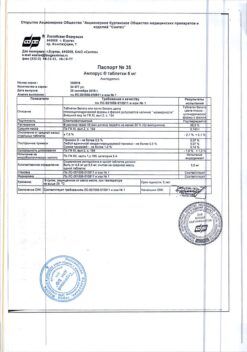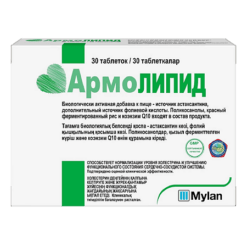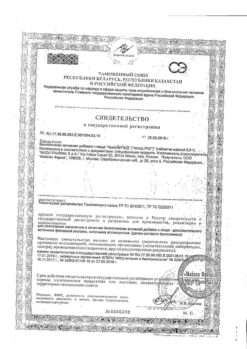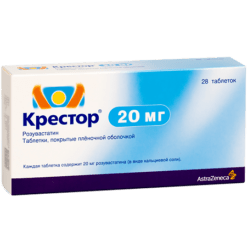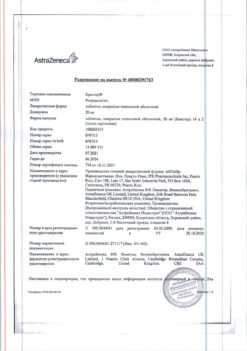No products in the cart.
Cardilopin, tablets 5 mg 30 pcs
€5.86 €5.21
Description
Cardilopin is an antihypertensive drug with antianginal effect. Its active substance, amlodipine, is a slow calcium channel blocker (calcium antagonist), inhibits incoming transmembrane flow of calcium ions into vascular smooth muscle cells and the heart.
The direct relaxant effect of amlodipine on vascular smooth muscle cells helps to reduce peripheral vascular resistance and provides the drug with hypotensive effect. Antianginal effect of Cardilopin is a consequence of dilation of peripheral arterioles and reduction of PASS (total peripheral vascular resistance) that results in decreased energy and oxygen consumption by myocardium, decreased strain on heart. Dilation of large coronary arteries and arterioles increases the flow of oxygen to normal and ischemic areas of the myocardium. Amlodipine does not cause reflex tachycardia, myocardial oxygen supply improves, including in spasm of the coronary arteries (unstable angina, Prinzmetal angina).
The administration of amlodipine once daily for arterial hypertension provides reduction of blood pressure (BP) in the prone and standing position, which maintains clinical stability for 24 hours. Due to gradual slow dilation of vessels, the development of acute arterial hypotension against the background of Cardilopin administration is unlikely. In patients with angina pectoris, taking the drug once a day increases the total time of possible physical activity before an angina attack and the time before a significant lowering of ST interval. In addition, the frequency of angina attacks and the need to take nitroglycerin are reduced.
Amlodipine has no adverse effect on metabolism and has no effect on plasma lipid levels, serum uric acid levels and blood glucose concentrations. The results of the study showed that use of amlodipine in patients with heart failure of II-III stages according to NYHA classification (New York Heart Association) does not worsen clinical symptoms, does not decrease patients’ tolerance of physical activity and left ventricular ejection fraction.
In NYHA stage III-IV heart failure, no increased incidence of cardiovascular events or mortality has been noted when combined with diuretics, ACE (angiotensin converting enzyme) inhibitors or digoxin. The use of Cardilopin in patients with bronchial asthma is indicated.
Indications
Indications
– Arterial hypertension (as monotherapy or, if necessary, as part of combination therapy with other antihypertensive drugs).
– Stable angina (as monotherapy or as part of combination therapy with other antianginal drugs).
– Angiospastic angina (Prinzmetal’s angina) (as monotherapy or as part of combination therapy with other antianginal drugs).
Pharmacological effect
Pharmacological effect
Cardilopin is an antihypertensive drug with an antianginal effect. Its active substance, amlodipine, is a blocker of slow calcium channels (calcium antagonist), inhibits the incoming transmembrane current of calcium ions into smooth muscle cells of blood vessels and the heart.
The direct relaxing effect of amlodipine on vascular smooth muscle cells helps reduce peripheral vascular resistance and provides the drug with a hypotensive effect. The antianginal effect of Cardilopin is a consequence of the expansion of peripheral arterioles and a decrease in peripheral vascular resistance (total peripheral vascular resistance), resulting in a decrease in energy and oxygen consumption by the myocardium and a decrease in the load on the heart. Dilatation of large coronary arteries and arterioles increases the supply of oxygen to normal and ischemic areas of the myocardium. Amlodipine does not cause reflex tachycardia; the supply of oxygen to the myocardium improves, including during spasm of the coronary arteries (unstable angina, Prinzmetal’s angina).
Taking amlodipine once a day for arterial hypertension provides a decrease in blood pressure (BP) in the supine and standing position, which maintains clinical stability for 24 hours. Due to the gradual slow dilation of blood vessels, the development of acute arterial hypotension while taking Cardilopin is unlikely. In patients with angina pectoris, taking the drug once a day increases the total time of possible physical activity before the development of an angina attack and the time until a significant decrease in the ST interval. In addition, the frequency of angina attacks and the need for nitroglycerin are reduced.
Amlodipine does not have a negative effect on metabolism, does not affect plasma lipid levels, serum uric acid levels and blood glucose concentrations. The results of the study showed that taking amlodipine for heart failure stages II–III according to the NYHA (New York Heart Association) classification does not cause a worsening of clinical symptoms and does not reduce exercise tolerance and left ventricular ejection fraction in patients.
In NYHA stage III-IV heart failure, there was no increase in the incidence of cardiovascular events or mortality when combined with diuretics, ACE inhibitors (angiotensin-converting enzyme) or digoxin. The use of Cardilopin in patients with bronchial asthma is indicated.
Special instructions
Special instructions
Studies in patients with heart failure stages II and III according to the NYHA classification when taking amlodipine did not reveal a decrease in exercise tolerance, left ventricular ejection function or worsening of clinical symptoms. The results of clinical studies in patients with NYHA stage III-IV heart failure showed that amlodipine does not increase the incidence of cardiovascular events or mortality when combined with ACE inhibitors, diuretics or digoxin.
During the treatment period, it is necessary to maintain dental hygiene and visit the dentist (to prevent pain, bleeding and gum hyperplasia).
The dosage regimen for the elderly is the same as for patients of other age groups. When increasing the dose, careful monitoring of elderly patients is necessary. The vasodilating effect of amlodipine develops gradually. Therefore, acute arterial hypotension after its use is very rare, however, before stopping treatment, a gradual reduction in dosage is recommended.
Amlodipine does not affect plasma concentrations of potassium, glucose, triglycerides, total cholesterol, LDL, uric acid, creatinine and uric acid nitrogen.
Active ingredient
Active ingredient
Amlodipine
Composition
Composition
1 table contains:
Active substances:
amlodipine 5 mg;
Excipients:
MCC;
sodium starch glycolate;
magnesium stearate;
colloidal anhydrous silicon dioxide.
Pregnancy
Pregnancy
Given the insufficient clinical experience with the use of amlodipine during pregnancy and lactation, the drug should not be prescribed to pregnant women, as well as women of reproductive age who do not use effective methods of contraception, unless the therapeutic benefit of the drug justifies the possible risk.
If it is necessary to use the drug during lactation, breastfeeding should be stopped.
Contraindications
Contraindications
Unstable angina.
– Clinically significant aortic stenosis.
– Severe arterial hypotension.
– Children and adolescents under 18 years of age (due to lack of clinical experience).
– Pregnancy.
– Lactation period (breastfeeding).
– Hypersensitivity to amlodipine and other components of the drug.
The drug should be prescribed with caution when:
– Liver dysfunction.
– SSSU (severe bradycardia, tachycardia).
– Chronic heart failure in the stage of decompensation.
– Mild or moderate arterial hypotension.
– Aortic stenosis.
– Mitral stenosis.
– Hypertrophic obstructive cardiomyopathy.
– Acute myocardial infarction (and within 1 month after).
– Diabetes mellitus.
– Elderly patients.
Side Effects
Side Effects
Frequent side effects (>1%), depending on the dose (in%): peripheral edema (frequency of occurrence for a dose of 5 mg – 3.0% and for 10 mg – 10.8%); dizziness (incidence for doses of 5 mg and 10 mg – 3.4%); hot flashes (for 5 mg – 1.4% and for 10 mg – 2.6%); heartbeat (for 5 mg – 1.4% and for 10 mg – 4.5%).
Frequent side effects (>1%), independent of dose (in%): headache (7.3%); abdominal pain (1.6%); increased fatigue (4.5%); drowsiness (1.4%); nausea (2.9%).
Other rare side effects: skin rash, gingival hyperplasia, dyspepsia, asthenia, arthralgia, myalgia, muscle spasms, sexual dysfunction (in both men and women), dyspnea, itching, pollakiuria.
Very rare side effects: liver dysfunction, jaundice, erythema multiforme, gynecomastia.
Other side effects: as with the use of other CCBs, patients with severe occlusive coronary disease may experience progression of symptoms of angina pectoris, myocardial infarction, arrhythmias (atrial fibrillation and ventricular tachycardia – which, however, cannot be differentiated from the underlying disease).
Interaction
Interaction
The simultaneous use of amlodipine with thiazide diuretics, beta-blockers, long-acting nitrates, sublingual nitroglycerin preparations, NSAIDs, antibiotics and oral hypoglycemic agents is possible.
Thiazide and loop diuretics, beta-blockers, verapamil, ACE inhibitors and nitrates enhance the antianginal and hypotensive effects of amlodipine.
Amiodarone, quinidine, alpha 1-blockers, antipsychotic drugs (neuroleptics) and slow calcium channel blockers may enhance the hypotensive effect of ammlodipine.
Calcium supplements may reduce the effect of slow calcium channel blockers (including amlodipine).
Inhibitors of microsomal oxidation, increasing the concentration of amlodipine in the blood plasma, increase the risk of side effects, and inducers of microsomal liver enzymes reduce it.
The hypotensive effect of amlodipine is weakened by NSAIDs, especially indomethacin (due to sodium retention and blockade of prostaglandin synthesis by the kidneys), alpha-adrenergic agonists, estrogens (due to sodium retention), and sympathomimetics.
Procainamide, quinidine and other drugs known to prolong the QT interval enhance the negative inotropic effect of amlodipine and may increase the risk of significant prolongation of the QT interval.
Cimetidine does not affect the pharmacokinetics of amlodipine.
Amlodipine has no effect on the pharmacokinetic parameters of digoxin and warfarin.
Grapefruit juice may slightly increase serum amlodipine levels, but this does not lead to significant changes in blood pressure.
Overdose
Overdose
Symptoms: marked decrease in blood pressure, tachycardia, excessive peripheral vasodilation.
Treatment: the patient should be placed in a horizontal position with raised legs. Gastric lavage, administration of activated charcoal, maintenance of cardiovascular system function, monitoring of heart and lung function indicators, monitoring of blood volume and diuresis are carried out. Intensive symptomatic therapy is carried out. To restore vascular tone, the use of vasoconstrictor drugs is indicated (in the absence of contraindications to their use); to eliminate the consequences of blockade of calcium channels – intravenous administration of calcium gluconate. Hemodialysis is not effective.
Storage conditions
Storage conditions
In a place protected from light, at a temperature of 15–25 °C
Shelf life
Shelf life
5 years
Manufacturer
Manufacturer
EGIS, Hungary
Additional information
| Shelf life | 5 years |
|---|---|
| Conditions of storage | In a light-protected place at 15-25 °C |
| Manufacturer | EGIS, Hungary |
| Medication form | pills |
| Brand | EGIS |
Other forms…
Related products
Buy Cardilopin, tablets 5 mg 30 pcs with delivery to USA, UK, Europe and over 120 other countries.

